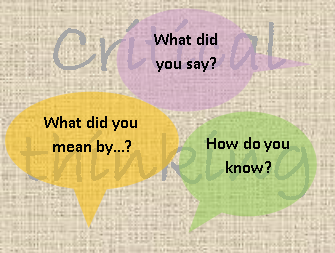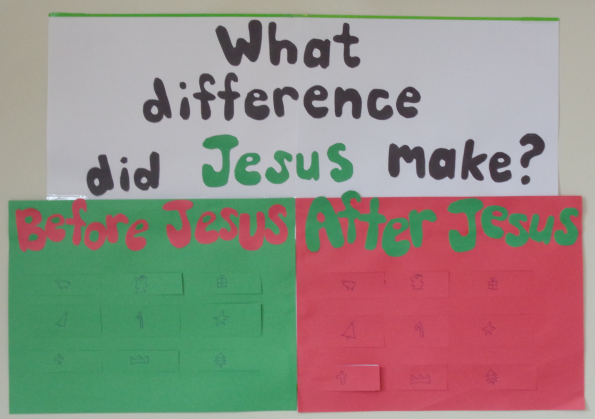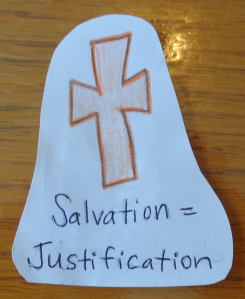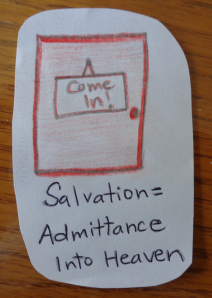This is the sixth post in a series on the twenty things everyone should know before they reach the age of twenty.
Something you must know by the time you reach twenty is that there are five minimal facts that virtually all New Testament scholars – Christian or skeptic – agree to be strongly evidenced and historical concerning the death and alleged resurrection of Jesus. These facts have been established through the same methods scholars would use to validate information in any other book of antiquity.
These five facts are not disputed by the overwhelming majority of experts.
Someone who refuses to accept these minimal facts is taking a position that even the majority of skeptical (non-Christian) New Testament scholars in this field (the people who should know) will reject. In that case, the burden of proof (the requirement to prove their point) is on the skeptic’s shoulders, not yours.*
With no further ado, here are the five strongly evidenced facts about Jesus death and alleged resurrection:
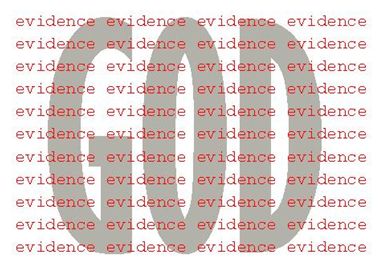
Before you reach the age of twenty, it is important to know that there is a substantial list of scientific discoveries which point in the direction of the existence of God, or at least of some sort of a supreme being that exists outside of time, space, and energy.
Your faith shouldn’t be a house of cards: remove one card and the whole thing falls down. There are a number of lines of evidence that together provide a strong argument for at minimum the possibility that God exists. I suggest that God is the most likely explanation to account for all of the lines of evidence laid out in the list.
But before I give you that list, it is important to understand a few things about it:
Knock ’em down proof
There is no one single piece of evidence that is a ‘knock ‘em down’ absolute, undeniable proof for the existence of God.
There is likewise no ‘knock ‘em down’ absolute, undeniable proof against the existence of God (i.e. that undeniably supports atheism).
I get the impression that many people, particularly atheists, are looking for such an overwhelmingly positive piece of evidence to prove the existence of God. Outside of God performing some sort of an undeniable miracle, we will never possess such an absolute piece of evidence.
But the logical reaction to this isn’t a retreat into atheism because science can’t say that it has discovered the final truth about anything either.
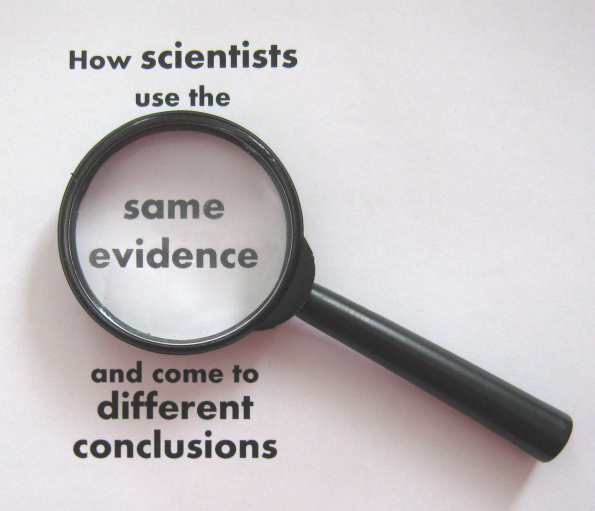 This is the fourth part of a series called 20 b4 twenty which lays out the twenty issues that every Christian should know before he or she reaches the age of twenty.
This is the fourth part of a series called 20 b4 twenty which lays out the twenty issues that every Christian should know before he or she reaches the age of twenty.
So far I’ve stressed that before you reach the age of twenty you need to know…
…what can and can’t be said about ‘Truth’
…that ‘faith’ isn’t blind, irrational, or opposed to reason (regardless of how the dictionary defines the term); and
…if science and faith are irreconcilable.
The fourth thing you need to know before you reach twenty is the key evidence that all scientists must account for to explain the origin of the universe, and the origin of life, the species, and humans, and how scientists come to different conclusions using the same evidence.
As this is WAY too much for one post to cover, I have limited the topic for this post to how scientists come to different conclusions using the same evidence for the origin of the universe as an example (and its still pretty long!).

Before you reach the age of twenty, I guarantee you will hear one or all of the following reasons why faith and science are incompatible:
- Most scientists are atheists (implying that science and faith don’t mix).
- Science is about facts and empirical evidence. Faith is about feelings, moral meaning, and value. (Implying that science and faith have no areas of intersection)
- Science doesn’t need God to explain anything (implying that God and faith have no place in science).
Let’s kick the tires of these arguments to see how well they stand up.
 .
.
20 b4 twenty
This is the second of twenty points that I think every person should learn before they reach twenty.
One of the things that every young person should understand before they reach the age of twenty is that there is a war on the word ‘faith’. It is because of this war that faith is often viewed as the opposite of reason, intelligence, and the ‘scientific mind’.
Consider how ‘faith’ is defined in the dictionary.
For example, the online Merriam-Webster dictionary defines ‘faith’ in the following way [1]:
- allegiance to duty or a person: loyalty: fidelity to one’s promises: sincerity of intentions;
- belief and trust in and loyalty to God: belief in the traditional doctrines of a religion: firm belief in something for which there is no proof [emphasis added]: complete trust;
- something that is believed especially with strong conviction; especially: a system of religious beliefs.
Notice that faith holds the connotation of believing in something for which there is no proof. Based on this definition of ‘faith’, it is perfectly reasonable for an atheist or skeptic to conclude that religion (‘faith’) is opposed to science (which is more interested in ‘facts’). And this is just what they have done.
“The whole point of faith is to believe regardless of the evidence, which is the very antithesis of science.” Michael Shermer
“Faith is the great cop-out, the great excuse to evade the need to think and evaluate evidence. Faith is belief in spite of, even perhaps because of, the lack of evidence.” Richard Dawkins
These are pretty heavy accusations against Christianity – or faith of any stripe. I also think the accusations are logical if we accept the definition of faith as described above.
But is the definition of ‘faith’ – belief in something for which there is no proof – really accurate for Christian faith, or for any use of the word ‘faith’ for that matter? When you say that you have faith in someone – God, your mother, the government, your doctor – is it because you have no proof of their reliability, or because of the proof of their reliability?
 .
.
The new emphasis of the Beyond Teachable Moments blog is a concept I’ve named ‘20 b4 twenty’. 20 b4 twenty refers to the twenty most important faith-related issues I believe young people need to understand before they reach the age of twenty. This is the list of issues that we want our children to know and understand by the time they are twenty.
Over the next twenty weeks, I’ll introduce you to each of the twenty issues in the list. I will then blog more specifically about each issue in future posts in random order. This way I will be able to keep some variety in the posts, rather than trying to comprehensively cover one issue at a time.

First up: Truth
I don’t think anyone can begin to purposefully build an unshakeable faith without first talking about the nature of ‘truth’. Questioning the existence, value, and know-ability of truth is a recent phenomenon in Western society and has completely upended the way we think and reason.
Can we know if truth exists? Is truth relative (true for some but not for others), absolute (ie: true for everyone, everywhere, and at all times), or somewhere in between?
This is one of the most foundational challenge that our society faces because how we answer it will shape much of the rest of our thinking around every other question we ask.
Common ideas about truth that are often taught in high school or college/university include: Read more…
 .
.
Happy 2016 everyone!
I have been doing a lot of thinking over the past few months about what I want to accomplish in order to purposefully build unshakeable faith in our two boys. I am always considering what I want them to know by the time they leave home (which I am conveniently ball parking at 20 years old!).
This means that I only have 10 years left with our oldest son.
That might induce some of you to roll your eyes. Ten years? Tons of time!
But, if you are a parent, think about how fast that first 10 years went by. If you’re anything like me, the answer is: FAST.
Through conversation with like-minded people, some internet research, and a lot of thinking, I’ve decided on a three-part go-forward plan for my own work with our kids which will naturally become the focus of the BTM blog site.
Read on to see what is ahead for BTM in 2016 and beyond.
 .
.
Did you grow up with Santa? If so, how did you feel when you found out that Santa wasn’t real?
I did grow up with Santa, and I distinctly remember feeling foolish when I discovered that he was a hoax. The reason I felt foolish was because I had ‘fallen’ for a lie – one that all the adults in my life knew wasn’t true but told me anyway.
Years later when I had children of my own, I had very mixed feelings about introducing Santa to them. I’ve discovered that I’m not the only one who feels this way about Santa. In fact, there are a number of prominent atheists who feel this way about the idea of Santa – to the point that they think Santa plays against Christianity.
Could playing the Santa game weaken your child’s faith? Read more…
 .
.
A while ago I mentioned that we are trying to encourage our kids to begin to think about and ask questions about their faith. This post is related to a question that our 10-year old recently asked.
Our kids seem to be fascinated with heaven lately. In a nutshell, here is how I understood the question: if we had a telescope powerful enough, could we find heaven floating (presumably on a cloud?) out there somewhere.
The questions betrays a lot about the ideas behind it. This is helpful in learning more about how your kids view or understand spiritual concepts. Quite frankly, however, I think a lot of adults might imagine heaven in a similar way. Get someone off the street to describe heaven and they’ll likely talk about clouds and harps and an old man with a long white beard named God.
What should we expect heaven to look like and where exactly is it?
 .
.
I like using an advent calendar at Christmas to count down the days to Dec 25th. Plus, we always make sure that our advent calendars have a purpose.
But it’s Dec 3rd already! Have you thought about what you’ll do to keep Christ in your Christmas this year?
Here are six different ideas that you could choose from this advent to prepare your children (and family) for the celebration of Jesus’ birth. All of these will enable you to teach Christian theology to your kids over Christmas.

I recently had the chance to talk with a young man in his early twenties about his faith and his upbringing. I’m always interested in hearing people’s stories about how they navigated doubts and challenges to their faith. This is partly because I do not come from a Christian home and have no experience with doubting the faith I was raised with, nor with trying to make it my own.
As a mom of two boys, I was particularly interested in what this young man had to say about his struggles in making is faith his own, as well as the most important things that his parents did to help him navigate the process.
I was surprised at his response.
![IMG_5242[1]](https://beyondtm.files.wordpress.com/2015/11/img_52421.jpg?w=595&h=334) .
.
Last week I shared six stories I’d used with our kids to illustrate the major differences between six explanations for the origin of the universe, life, and humans. Reading these stories will get you a long way toward understanding some of the major differences between these explanations. However, analyzing them – even at a child’s level – will reveal some interesting trends.
Here’s more on how we used the exercise from last week to learn interesting things about how different groups explain the origin of everything.
![IMG_5242[1]](https://beyondtm.files.wordpress.com/2015/11/img_52421.jpg?w=595&h=334) .
.
A while ago I shared some activities I’d done with our kids to help them understand some of the evidence for God that we see in science and the natural world. I called the series of activities Finding the Fingerprints of God (you’ll find links to these activities on this page).
The Finding the Fingerprints of God activities focus a lot on what didn’t happen – e.g. the universe couldn’t have sprung into existence unaided; life couldn’t have formed spontaneously in some warm little pool; etc. What the Fingerprints of God activities didn’t answer was what did happen.
I’ve been wanting to discuss the various explanations (often called ‘theories’ in pop culture) for the origin of the universe, the origin of life, and the emergence of humans with my kids ever since. Two weeks ago on a PD Day, I finally did.
Do you know how many different explanations there are to account for the origin of the universe, the origin of life, the emergence of humans?
If you said two – creation and evolution – you’ve got too few.
If you think there are three – creation, evolution, and theistic evolution (God exists but uses evolution in various ways) – you still have too few.
How about four – old-earth creation, young-earth creation, theistic evolution, and evolution? Getting closer, but you’re still not there.
Gerald Rau, in his book Mapping the Origins Debate argues for six explanations: old-earth creation, young-earth creation, naturalistic evolution, and three categories of theistic evolution because this category has such a broad range of ideas on the beginning of everything that it can’t be treated as one category.
To make this whole exercise fun and memorable, I rewrote the Genesis 1-2 account from the viewpoint of each of these explanations.
Back in April of 2014, I shared how we were trying to get our kids into the habit of asking questions about their faith in order to assist them in making their faith their own (i.e. not borrowed from us). We found a way to do this by piggybacking on the ‘Wonder Wednesdays’ concept that our kids’ school uses to encourage questions in the classroom. Each Wednesday at dinnertime, we invited our kids to ask us questions about God and faith. There were no restrictions on the number or nature of the questions. We would then take the time either to discuss answers to the questions over dinner or research the answers and get back to them about their questions.
It’s been a bit of an eye opening experience for a number of reasons that I wanted to share with you. There have been some positives and some negatives, and a lot of learning and insights on our part with this activity. I’ve been trying to think about how we can improve our ability to keep the concept going and instill the habit of asking questions in our kids and as a family. Here are some specific lessons learned from our journey in trying to develop this habit.
.
Fourteen neuroscientists from the University of California, the University of Michigan, and Stanford University analyzed thirty samples of human brain tissue taken from different parts of the brains of a number of different people. This was a blind test; the neurosurgeons did not know anything about the identify of the person from whom each tissue sample was derived. Without exception, these neuroscientists were able to determine the sex of the individual from whom the sample was derived (1).
Why is that so?
It turns out, the brain is a sexual organ. It is paramount in determining sexual identity (not the physical genitals, but the metaphysical sexual identity). From birth, human brains are physically differentiated based on a person’s sex, function differently based on sex, and produce different results based on sex.
This idea was introduced to me by Nora Hale . Here are a list of gender differences between males and females that are hard-wired into our physical bodies – not just our brains – and affect how our bodies work. Some of them might surprise you.
Last week I read a blog post that suggested that religion and politics no longer be discussed on Facebook – ever, by anyone. The person advocating this position is a strong believer in God.
A few days later, I was listening to a radio talk show program and was very surprised to hear all three of the program’s hosts agree unanimously that religion and politics were not allowed as dinner table conversation topics in their homes. One of the personalities even admitted that they would say grace before the meal, but that was it as far as religious conversation was allowed around the table.
Do these comments strike you as strange and sad? They were made by people whose life work involves either religion or news and political comment!
I know that the notion of religion and politics being ‘taboo’ topics is not new, but there is something very strange about not being free to discuss topics that address the fundamental and ultimate questions of our existence. Parents in particular should ensure that religion and politics are welcome discussion topics at the dinner table.
What has happened to make religion and politics ‘taboo’ topics in our society?
Are you someone who makes people not want to talk about religion and politics?
You may have heard the notion that all religions are essentially the same. I have come across three primary ways that this idea has been illustrated. Which of these explanations seems the most likely to you?
- Blind men describing an elephant. Different religions can be compared with a group of blind men tasked with trying to describe what an elephant is like. Each of the blind men touches a different part of the elephant and describes what he thinks the elephant is like based on his exposure to the elephant. The one near the trunk concludes that “An elephant is like a hose” while the one near the leg concludes: “No, an elephant is like a tree”. The main idea is that all of the blind men are describing the same thing, albeit imperfectly based on their own personal experience.
- All religions are paths to God. The illustration used in this analogy is a multisided mountain. Each religion is like a different ‘path’ up the mountain. Each path is different, and may require different climbing skills and provide different experiences, but they all reach the top or the mountain (i.e. God) in the end. The main idea is that all paths up the mountain are equally valid.
- The Golden Rule. Here is a third way of illustrating why/how all religions are essentially the same. Proponents of this view indicate that all religions teach basically the same ‘Golden Rule’: “Do to others what you would have them do to you.” The implication is that all religions essentially rest on this rule, and that no other fundamental teaching is more important or more central to each faith than how we treat each other.
Perhaps you have some other explanation for how all religions are essentially the same (besides “They’re all a bunch of hogwash”). If so, I’m with you. I think there is something entirely different that is common to all religions.
.
Suppose you were thinking of going on a spiritual quest. How would you decide which religion to pick? Would you pick a religion based on:
a) how familiar it is to you?
b) how well it fits your lifestyle or beliefs?
c) how well it provides something meaningful or convenient to you?
d) how simple and intuitive it is?
e) how factually accurate it is based on our human experience and our current understanding of science?
f) all of the above?
g) something else (please specify)?
This is really a classic question, and for many it can be a very difficult one to navigate.
In this post I am going to attempt to lay out three ‘first rung’ ideas about how you might consider evaluating the various religious options available to you before you even delve into the details about each religion. There are more factors that you might consider, but I think these three help to establish the most promising religious candidates. I’d be interested in your feedback on them. Read more…
 You’ve probably heard the phrase: “All religions are basically the same”. Regardless of what your answer to this statement is, there is one very interesting aspect that is common across the majority of religions, and that is Jesus. Most religions have something positive to say about Jesus because he is universally highly regarded. They include him in their religious framework.
You’ve probably heard the phrase: “All religions are basically the same”. Regardless of what your answer to this statement is, there is one very interesting aspect that is common across the majority of religions, and that is Jesus. Most religions have something positive to say about Jesus because he is universally highly regarded. They include him in their religious framework.
Its seems that everybody wants Jesus.
I was fascinated to discover this. It became part of what I covered with our kids this summer as we learned a bit about other religions. Here are some examples of how various religions make a claim on Jesus.
 After quite a break from posting – it was summer after all – here is a sequel post to my last one that looked at Christianity in a World of Religions.
After quite a break from posting – it was summer after all – here is a sequel post to my last one that looked at Christianity in a World of Religions.
First, a question. How would you answer this?
What are the major aspects of Christianity that make it stand out from all other major religions?
One of my all-time favorite lectures on Christianity and religious pluralism was by Craig Hazen of Biola University. In it, he sets out some deceptive simple ideas that most Christians do not have a clue about. What he does is paint the picture of Christianity that we all know, but juxtaposes it against other religions in a way that is startling. You are left realizing that Christians rarely appreciate what we have.
Here is one no brainer fact of about Christian doctrine that you may not have thought about but which make it stand apart from all of the other major world religions. Read more…
We’ve been busy learning about different religions so far this summer.
I know some people think that children should only be taught Christianity. Often the illustration of money fraud is given to support this claim. People who are trained to detect counterfeit money only study genuine bills. When a counterfeit bill is presented to them, they can easily identify it as a fake. In the same way, if we teach our children to recognize the truth (ie: Christianity), they will be in a position to clearly tell what its false (ie: other religions).
I sometimes wonder if the analogy fits our situation though….
Ah … summer…
Wait! No, no, no – not time to relax and take a break from parenting – at least not entirely. This is your golden opportunity to instill faith lessons into your children’s lives. Don’t miss it!
For the past four summers, we’ve been gearing up with ideas to help move our kids’ learning and understanding about Christianity further along. I try to do a lesson every weekday of the summer (give or take), but also try my best to make the lessons short (15-20 minutes right after breakfast) and (hopefully) memorable.
I’ve mentioned before that if you have children under 10, focus more on facts with them. There are a bunch of resources on this blog site to support you with this.
Once your kids reach 10, they are likely ready to learn logic and critical thinking. You should capitalize on their natural (or perhaps sometimes annoying) interest in this.
This year, instead of spending a lot of time planning lessons of my own, our kids are finally old enough to take advantage of some of the ready made resources out there. Here are a few that we’ll be trying this summer.
Recently I was involved in a discipleship program at our church for new Christians. One of our participants had gotten caught up in the annual Easter specials that seek to erode the credibility of the Bible and argue for additions or ‘corrections’ to the historical New Testament doctrine. These television specials always quote ‘international experts’ and usually introduce little known or new material that challenges the NT canon or traditional doctrine.
Hat tip to Wintery Knight for directing me to this great set of posts by Mike Kruger who provided what he calls “Ten Basic Facts About the NT Canon That Every Christian Should Memorize.”
I’ve created a summary cheat sheet on the posts below, but I encourage you to use the links to read the original posts for yourself. This could be used as a tool by parents to discuss these points with their kids over dinner, or by anyone who wishes to firmly establish how the NT was created for him or herself.
“I know a secret about you,” Stand to Reason’s Greg Koukl sometimes likes to say in his talks. “You have low self-esteem.”
How does he know this secret? Because almost everybody does.
According to psychiatrist David Burns, possibly the most common mistake that people make in evaluating their self-worth is measuring it against outward achievements, love, or status. These are the kinds of weaknesses we often find in teens, although adults are not immune either. The problem is, no amount of outward achievement, love, or status can provide you with anything but a temporary boost in self-esteem.
That’s because self-esteem can’t be earned. Only you can determine your self-worth.
If you are a teen, or are the parent of a teen, this may be one of the most helpful lessons to learn or teach during the teen years.
 I like personality tests. Maybe its a bit narcissistic, but I like trying to figure myself out. Mostly, I like discovering that I am, in fact, normal. I like finding out that I am a ‘category’ and that others think and behave like me.
I like personality tests. Maybe its a bit narcissistic, but I like trying to figure myself out. Mostly, I like discovering that I am, in fact, normal. I like finding out that I am a ‘category’ and that others think and behave like me.
Not ‘boring normal’, as in being just like everyone else. We need variety. But ‘okay normal’, as in knowing that I don’t have some kind of a strange and unfixable personality quirk.
Maybe not everyone feels this way. Not everyone likes personality tests. I know someone who does not like these tests because he never ends up in ‘a category’.
However, I know I’m not alone in liking the feeling of being ‘normal’. I spent some time this morning reading online postings on the Kids’ Help Phone website. Apparently many teens and tweens feel relief then they read others’ account on this site because they realize that their problems are ‘normal’. Its enlightening reading for any parent. Just what did they read that made them feel ‘normal’? Here are some of the take aways I gleaned from the site:
I’m starting to look at how we can incorporate small measures into our daily life to begin to teach critical thinking skills to our kids, and in particular to our tween.
Why do this?
A fundamental skill that is not being taught very well in school systems or the church is the ability think critically about the information that bombards us, and to figure out what to do with all of it.
Critical thinking helps a child to learn to think for himself. It helps him to separate fact from opinion and to make a reasoned judgement from the information presented.
I believe critical thinking will be necessary for building a solid foundation for a child’s faith, and will be required in order to turn a borrowed faith (which is what most kids have) into a personal one.
Here are some baby steps to help you to get started.
I mentioned in a previous post that our oldest child will soon be 10 and is already showing signs of moving into the next phase of childhood (note: I cannot quite bring myself to say ‘adulthood’ yet!). It’s stunning to think that we have a middle-schooler in our house.
I’ve talked about how we are starting to change the focus of his Christian upbringing. Recently, I came across an excellent broadcast by Focus on the Family that featured Cynthia Tobias and Sue Acuña. The broadcast provides some insight into some of the top needs of kids ages 10-14. I found it to be very insightful.
Ten to fourteen is a tough age. The relationship that you forge with your middle schooler during these years will be foundational to your relationship with him or her into high school. How do you start to get inside that increasingly confusing headspace?
Tobias and Acuña provide these insights into the top needs and the top fear of 10-14 year olds:
Several years ago I was looking for ideas on how to begin to teach apologetics and Christian theology to our young children (then 5 and 7). I had a revelation while reading Dorothy Sayers’ article The Lost Tools of Learning that has revolutionized how we teach any difficult or complicated topic to our young children.
In her article, Sayers critiques the ‘modern’ education approach (NB: the essay was first presented in 1947) as failing to teach children how to learn. Sayers outlines a three staged approach to teaching children how to learn that is based on medieval approaches to education.
Sound pretty archaic? And yet it works. In fact, Sayers’ approach is embedded in every activity we’ve done with our kids to date. It basically breaks your child’s learning life down into three critical phases, each of which build upon each other.
Here’s what I mean and how it works.
I think many of us would say that the university years are the years when our kids are most likely to face a crisis of faith. We think of this as the time when kids are taking a ‘borrowed’ faith and deciding if they will make it their own or not.
Many would also suggest high school – particularly the older grades – as having a strong potential for a crisis of faith. That’s when a child begins to cross over to adulthood – albeit in fits and starts.
I would have said either of these times were likely candidates for a crisis of faith. But I recently learned that my information is outdated. There is a new average age when kids hit a crisis of faith.
Are you looking for material to help you teach your young children about Christian apologetics? Four years ago, so was I. But I couldn’t find anything that was designed to be hands-on, memorable and fun.
So I started to invent activities to teach our kids the basics about Christian apologetics. For a long time I’ve been meaning to corral all my training materials into one place, and in some kind of logical order.
This post does just that.
Consider the window of influence you have to train your children to have and hold on to a faith in God throughout their lives.
I’m not talking about a blind faith. And I’m not suggesting that your kids should have faith in God just because you do.
I’m suggesting that you investigate the evidence for and against God’s existence with your children and help them to understand where the weight of evidence lies. And I’m suggesting that you do it now before alternative ideas are taught in school. If you do, you’ll help your kids to be prepared to think critically about what they learn.
How long do you have to actively teach your children about your faith?
Not a ton of time. The largest window you have to is when they are young. That is when they naturally spend more time with you. When your children are teens, they will have less time and less interest. That’s just a fact.
Spring break is around the corner. Why not take advantage of it and spend even 15 minutes a day teaching your kids about a new topic. That’s what I’m going to be doing!
Here are some ideas that I’ve used:
In my last post I concluded that humans appear to have unique and far superior cognitive capacities than animals. Why is this so?
Is the Bible correct when it claims that humans are unique in all creation because we have been made in the image of God?
Or is there an evolutionary explanation for our apparent superiority to animals?
Embed from Getty Images
Are humans smarter than animals?
Is it ‘speciesism’ (discrimination against animals) to believe that humans have a greater moral and ethical worth than animals?
Do humans belong on the top rung of Darwin’s Tree of Life, or are they in a class all their own?
Do vegetarians and vegans walk a higher moral ground than the rest of us?
Is it just as wrong to exterminate rats as it was to exterminate Jews and other undesirables during the holocaust?
All of these questions have at least one thing in common: whether or not humans and animals have the same moral and ethical worth. They pit two worldviews against each other: imago Dei vs. evolution. In a logical world, they can’t both be right. So, which one is it?
Is there evidence for the idea that humans are morally and ethically superior to animals outside of the Bible?
 There is a lot of speculation today about how the books in the Bible were ‘chosen’. Did the early church leaders supress material that they did not like? Did they route out and destroy material that didn’t go along with their thinking? Did they pick books arbitrarily? Or did they have good reasons for choosing the books that ‘made it’ into the Bible?
There is a lot of speculation today about how the books in the Bible were ‘chosen’. Did the early church leaders supress material that they did not like? Did they route out and destroy material that didn’t go along with their thinking? Did they pick books arbitrarily? Or did they have good reasons for choosing the books that ‘made it’ into the Bible?
If you do a little bit of research, you’ll discover that the early church had specific and very sensible tests that they used to determine which books were included in the Bible. Read on to find out what these tests were and try out an activity designed to teach this to young children.
It’s pretty easy to guess who wrote the books with their names attached to them – like Matthew or Ezra or Jeremiah. But what about the others? What about Genesis? Or Judges? Or Hebrews? And who were these people? Should they be trusted?
Even if you’ve never wondered about the answer to these questions, no doubt your kids – or their friends – will. This is the latest installment of posts aimed at helping you to discuss theological questions with your children. Here are four answers to the question: Who wrote the Bible?
We recently had an extended family vacation during which I was reading and studying the book of Romans. It struck me how often Paul contrasted the old and new covenants with God in the beginning of that book. When we returned home from our trip, I thought about these contrasts in the context of Christmas.
So much of our focus at Christmas is anticipating the arrival of Jesus. It struck me that our kids know that Jesus is important, but they may not realize what a striking difference He made to the way in which we have a relationship with God. We decided to try to illustrate this to our kids through a mini advent calendar. Its a worthwhile lesson even if you don’t make an advent calendar activity out of it – read on to find out what we did.
 I like using an advent calendar at Christmas to count down the days to Dec 25th. However, we always make sure that our advent calendars have a purpose.
I like using an advent calendar at Christmas to count down the days to Dec 25th. However, we always make sure that our advent calendars have a purpose.
Here are three ideas you could consider using this advent to prepare your children (and family) for the celebration of Jesus’ birth. All of these will enable you to teach Christian theology to your kids over Christmas.
 Who is responsible for preparing your child for adulthood: his teachers, or you?
Who is responsible for preparing your child for adulthood: his teachers, or you?
Who is responsible for preparing your child’s faith to last into adulthood: his Sunday School teachers, the Youth Pastor, the Senior Pastor, the campus ministry staff worker, or you?
Of course, YOU is the answer. But how do we accomplish this?
Here are five key elements that every parent’s plan should include.
I’m not sure if there is a more painful reality for a Christian parent to be confronted with than learning or observing that her child is losing, or has lost, his faith. Very few other challenges can raise as much anger, panic or emotional turmoil in us as this one can. If you find your self in this situation, here is a suggested course of action that you can take to address the changes you are seeing in your child.
 I’m taking a short break from my series on Theology for Kids to share some things that I’ve been thinking about lately.
I’m taking a short break from my series on Theology for Kids to share some things that I’ve been thinking about lately.
For some of you, the idea of creating a Christmas wish list at the beginning of November is preposterous. For others, this post will come way too late because you will have already finished your Christmas shopping. I’m in the first category, which means that writing a post with Christmas in the title right now is a stretch for me!
Christmas and the advent of a New Year are times to take stock of where you are going as a person and as a family. If you have children, you’ll marvel at how fast time has flown. And perhaps wonder what happened to all those Christmas presents from last year…
How did you do this past year – did you feel on top of things? Were you carried along by whatever winds blew your way or were you thoughtful and purposeful in how you spent your time? How are your children growing and changing? Are you creating opportunities to specifically talk about your faith and explore how your children are growing or understanding theirs? What key changes do you see in your kids? Where are they struggling as far as faith is concerned? Are they asking questions about God, the Bible and their faith?
Every year, my husband and I try to think of where are kids are at with their faith and our training of them, and come up with some resources that we can use as a family in the upcoming year. Then we put these on our Christmas wish lists!
Here are some recent ideas I’ve heard about from friends for your consideration. I’m thinking of adding them to my list!
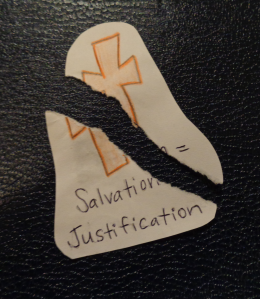 There is a lot of debate among Christians as to whether or not someone can lose their salvation. It’s something that we will have to help our kids to understand. Several years ago, my husband and I took a membership course at our church where a list of transactions that take place at salvation was presented as part of the material. By the end of the course, I was pretty convinced that someone who has made a genuine decision to follow Jesus and demonstrates this by acting upon it cannot lose their salvation later on even if they backslide. Here are several reasons why:
There is a lot of debate among Christians as to whether or not someone can lose their salvation. It’s something that we will have to help our kids to understand. Several years ago, my husband and I took a membership course at our church where a list of transactions that take place at salvation was presented as part of the material. By the end of the course, I was pretty convinced that someone who has made a genuine decision to follow Jesus and demonstrates this by acting upon it cannot lose their salvation later on even if they backslide. Here are several reasons why:
Can your kids explain what happens at salvation? Often we think of the act of praying to receive salvation as a one-sided activity. We are the ones praying. But I was surprised a few years ago to learn just how many different transactions take place when a person prays to receive God’s gift of salvation. We thought it was important enough to teach our kids, so we invented a fun way of doing this.
Read on for the list of transactions that take place at salvation and how to turn the list into an activity for kids.
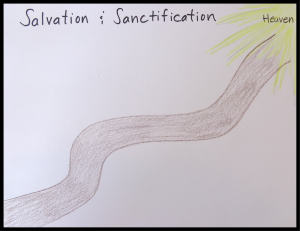 I’d be curious to know how your kids would respond to the following question:
I’d be curious to know how your kids would respond to the following question:
“How do you know that you get to go to heaven?”
We found that our kids confused salvation with sanctification when they answered that question. I know that they are not the only ones. In fact, many adult Christians do the same thing. Here is the first of a few posts where I’ll describe some activities we did with our kids to help them to understand the Biblical answer to that question and how to differentiate salvation from sanctification. It’s the latest installment of my Theology for Kids series.
 I’ve been discussing Theology for Kids by addressing 12 Questions to Get you Started. Research shows that many kids do not have a firm grasp on Christian theology, which makes them more vulnerable to tack on secular ideas and worldviews to their faith. As a result, we get young adults who aren’t sure if truth exists, can’t differentiate the Christian God from that of any other religion, are not sure if sin really matters, are skeptical about eternal punishment (aka hell), etc.
I’ve been discussing Theology for Kids by addressing 12 Questions to Get you Started. Research shows that many kids do not have a firm grasp on Christian theology, which makes them more vulnerable to tack on secular ideas and worldviews to their faith. As a result, we get young adults who aren’t sure if truth exists, can’t differentiate the Christian God from that of any other religion, are not sure if sin really matters, are skeptical about eternal punishment (aka hell), etc.
As I insist on these posts being as practical as possible, here’s the approach we took:
 Does your child have an imaginary friend? Over the years, ours have. Right now its Zeff – an invisible boy who can do, see and be anything our son wants. As such, Zeff comes in very handy.
Does your child have an imaginary friend? Over the years, ours have. Right now its Zeff – an invisible boy who can do, see and be anything our son wants. As such, Zeff comes in very handy.
But there’s a problem. Both Zeff and God are invisible. I think this raises a very fair question.
If God is invisible, so to speak, how can we know that He actually exists?
Or, to put it in kid language: how is God different from Zeff? Can we prove that God actually exists, even though Zeff doesn’t?
![]() If you’re tracking with me, you’ll know that I’m spending some time teaching theology to our kids. I posted 12 questions a few weeks ago to help you get started doing this as well. This week I’ll look at answering the question ‘How are we physically different from God?’
If you’re tracking with me, you’ll know that I’m spending some time teaching theology to our kids. I posted 12 questions a few weeks ago to help you get started doing this as well. This week I’ll look at answering the question ‘How are we physically different from God?’
Building on my last post that compared toys to humans, you would have already asked your kids to tell you how their toy Playmobil or Polly Pocket figurines are different from a real person. This can warm them up to thinking about how we are different from God.
I’ve taken up a suggestion to discuss each of the questions in my Christian Theology for Kids: 12 Questions to Get You Started post in more detail. I updated that post since writing it to add another link to a child-friendly resource that will help you to explain Christian theology to your children at their level. If you haven’t seen it, check it out.
Today I’ll provide ideas on how to answer the question: “How are we like God?”
To start off, gather some kind of toy such as a Playmobil or LEGO figurine (preferably a figurine of a person!), or a doll figurine such as Barbie or Polly Pocket, or a stuffed animal or other kind of doll.
If you don’t think discussing theology and doctrine with your kids around the dinner table sounds like much fun, you’re not alone. Unfortunately, many young Christian kids are not amassing accurate Christian doctrine and its having a serious impact on their faith.
Teaching theology and doctrine was one of my focuses this summer with our kids.
Here’s how I figure it: If our kids grow up to reject Christianity, I at least want them to have an accurate understanding of what it is and what it isn’t. I want them to understand what answers it does have – and how solid they are – to explain evil and suffering, the meaning of life, where we came from and what happens after we die, how we should live, etc. I don’t want them to fall for strawman arguments against Christianity, and I want them to know the weaknesses of alternate worldviews.
I have to say, I was surprised at how many questions came out of these discussions about doctrine! If you want to get your kids asking questions about their faith, consider these twelve questions to get the ball rolling.
A while ago I mentioned that we began to teach our kids how to ask and answer questions about the Bible passages that they were reading on their own. We explained that we were teaching them how to ‘chew’ on the Bible themselves. We’d used the illustration of graduating from baby food (which they used to love) to solid food like pizza (which they now love).
When we first started this process, we were mainly focusing on books of the Bible with a lot of action – like the gospels, Acts and Genesis. Now our kids are reading books like the epistles and letters of the apostles. These books are a bit different and provide us with more opportunity to discuss the author, setting and purpose of the book and how these are relevant to understanding the book itself. We’ve been thinking that we need to update our approach to ‘chewing’ on the Bible as well, so here’s our first attempt to do so.
About this time during the summer holidays, two thoughts always hit me. First, its always sad to see summer begin to wane. All the back to school sales become more forceful and compelling, reminding me that September is almost here.
But I also often feel tired from the push of summer. We’ve had personality conflicts. We’ve worked on character traits. We’ve had distractions and last minute requests and extra work and inertia to plow against.
Plus I’ve mentioned before that we make the most of the summer months to find ways to teach our kids about Christianity. Most days I try to do some sort of a fun, hands on learning activity. They’re short and to the point – about 15 minutes in all. But its hard to keep that pace up in the midst of everything else. I never have all of my activities or ideas planned out before summer begins, and I never have time to create new ideas during the summer months, although I always think I will! By mid-August, I have a harder time keeping up the pace of thinking creatively of ways to teach our kids about their faith. It would be easy to just give up at this point. Really, I’d rather just let the rest of summer roll on by from the comfort of the hammock.
That’s why I was particularly happy to receive this little zinger from Kevin DeYoung. Read more…







